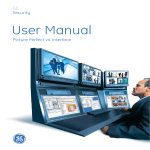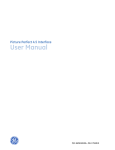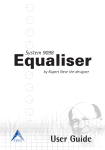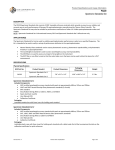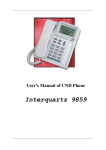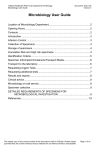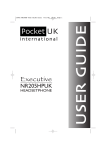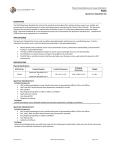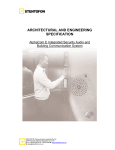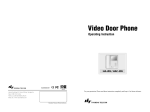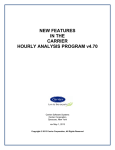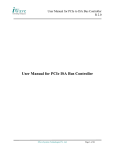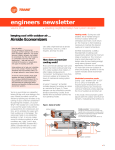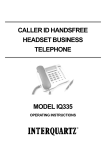Download User manual
Transcript
® Alphacom a200 a RANGE telePHONE USER GUIDE Versatility & Value 1 CONTENTS Page 1. GUARANTEE 2. CONDITIONS OF USE 3. facilities and features 2 2 3 4 5 6 7 8 8 8 9 9 9 9 10 10 10 10 10 11 11 11 11 11 11 12 12 13 4.LOCATIONS OF CONTROLS - front view 5.LOCATIONS OF CONTROLS - SIDE VIEW 6. HEADSET HOOK ASSEMBLY - (optional) 7. UTILISATION OF CONTROLS 8. INSTALLATION 9. SETTING THE DIALLING AND RECALL MODE 9.1 THE DIAL MODE SELECTOR SWITCH 9.2 THE RECALL MODE SELECTOR SWITCH 9.3 the message waiting selector switch 9.4 setting the ringer - ringer volume slide control 9.5 connecting to telephone socket 10. Operating procedures 10.1 last number redial 10.2 memory operation 10.3 DIALLING NUMBERS FROM MEMORY 10.4 pause 10.5 tone button 10.6 handset mute button 10.7 latchable base mute 11. Operating procedure for pbx connection 11.1 pbx recall 11.2 general use 12. in case of difficulty 13. CARE OF YOUR a200 headsetPHONE 14. wall mounting 1 1. GUARANTEE Your a200 Telephone is guaranteed from the date of purchase. If found to be faulty within the guarantee period it will be repaired or replaced at our discretion, subject to our standard terms and conditions. The guarantee does not cover accidental damage or negligence. The telephone must only be used in the U.K. in accordance with its instructions for use and must not be tampered with, or taken apart by anyone who is not an authorised representative of the company. The guarantee in no way limits your legal rights. Should you have any problems, please return your telephone to your supplier. Please ensure that a note of your name and address and details of the problems are enclosed, together with a copy of your purchase invoice, and that goods are returned in their full original packaging with instructions enclosed. Goods are returned to the manufacturer at the customers own risk and expense. 2. CONDITIONS OF USE Your a200 Telephone is approved for use on business or private direct exchange lines and on compatible PBX extensions. When connected to a direct exchange line this must be a standard exclusive (not shared service) line. The line should cater for either loop disconnect or multifrequency signalling. The telephone can signal Timed Break and Earth Recall. This telephone is not suitable for use as an extension to a payphone or on shared service or ( 1+1 ) carrier systems. The dialling code ‘999’ can be dialled on this apparatus for the purposes of making outgoing calls to the BT Emergency (999) Service. 2 3. Facilities and Features This apparatus has been approved for the use of the following facilities - Simple telephone facility - Loop Disconnect or DTMF Signalling (selectable) - 32 digit Automatic Storage of last number dialled - 20 Direct Memory locations of 24 digit capacity - Ringer Volume control - Ringer Pitch control - Time Break or Earth Loop Recall (selectable) - Operation in absence of proceed indication - Suitable for PABX’s providing secondary proceed indication -Push-to-Mute function or optional Push-to-Speak - Message waiting (6 wire line cord required for 6 wire systems not supplied) - Memory Protection Switch Any other usage will invalidate the approval of the apparatus if as a result it then ceases to conform to the standards against which approval was gained. 3 4. 4. a200 a200 Telephone Telephone -- Front Front View View 44 5. a200 Telephone - Side View 5 6. Headset Hook Assembly (Optional) Hi Elevation Lo Elevation Position the Headset Hook in the required elevation (Hi or Lo) then slide the cover on to secure in place. 6 7. Utilisation of Controls The button functions are as follows: 0 - 9 - Dialing digits. * - # - Dialling codes for MF signalling Recall - For use on PBX or for star services LNR - Last number redial function Tone - Switches from Loop Disconnect to DTMF during dialling Pause - Insert a pause in the dial sequence Mute - To prevent the other party from hearing you (ie. push (on handset) down to mute) or, alternatively, on specially adapted models this can be amended to push-to-speak. In this instance, the phone will be clearly marked as such. Latchable Mute - To prevent the other party from hearing you (i.e. push (on base) to (on base) mute). LED will illuminate when in use. Push button again to continue normal (two-way) conversation. Headset - To enable headset operation, LED will illuminate when in use. The switch functions are as follows: Ring Vol - Allows you to set the level of the ringer loudness Ring Pitch - Allows you to set the pitch of the ringer ELR/TBR - Sets the Recall to Earth (ELR) or Timed Break (TBR) Recall Tone / Pulse Dialling - Tone or Pulse dialling selector switch Memory Protection - Allows you to protect numbers stored in memory location Message Waiting - Set the message waiting to 4 or 6 line configuration Visual Indicators: Ring- This indicates an incoming call by lighting up. Message Waiting - Operates where PABX message waiting is operational 7 8. Installation Your a200 Telephone is designed to be plugged into the new phone sockets adopted in the U.K. If you do not have a primary socket you can obtain this from your BT sales office, whose address is in the telephone directory. Additional sockets can be fitted by yourself using one of the extension kits commercially available. For additional sockets required on a PBX you should contact your PBX supplier/maintainer. The plug and socket are designed so that the plug will only fit the socket the correct way round. Please note any other method of connection will invalidate the instrument approval. On any exchange line you may have as many sockets as you like, the number of which may exceed the number of telephones. Your telephone can be moved from socket to socket by simply plugging it in where you wish. However, if you unplug your telephone whilst involved in initiating a call or talking, the call may be lost. There is a limit on how many telephones may be connected to an exchange line at any one time. Plugging in too many telephones will overload your exchange line and as a result your telephones may not ring. To enable you to check if you are overloading a line, a Ringer Equivalence Number (REN) is marked on the base of the telephones you wish to plug in. The ringers should operate satisfactorily if the sum of the REN numbers are 4 or less.Include all BT equipment provided. If a BT telephone is supplied unmarked you can assume it to have a REN of 1, but this should be confirmed by your local BT sales office. NOTE: NOT ALL TELEPHONES HAVE THE SAME REN VALUE. This a200 Telephone has a REN of 1. Once you have completed the “Initial Set-up Procedure” ( Section 4) then plug your telephone into the socket. Once plugged in wait for 4 seconds before making or answering a call. Your a200 Telephone is now ready for use. 9. Setting the Dialling and Recall Mode 9.1 the dial mode selector switch Many telephone exchanges in the UK still use the PULSE dialling system. However, as new exchanges are commissioned and older exchanges are updated, the dialling system is being changed to TONE dialling which gives faster connection as well as access to new services. Your a200 Telephone allows you to operate on either system and the DIAL MODE SELECTOR SWITCH should be set to the dialling mode required by your exchanges. Set the switch to the PULSE (Loop Disconnect) position for PULSE dialling, or to the TONE (Multi Frequency) position for TONE dialling. If in doubt about the correct dialling mode used by your exchange, please consult your Network Operator. 8 9.2 the recall mode selector switch If you are connected to a TONE dialling exchange, set the switch to the TBR (Timed Break Recall) position to enable you access certain Network Services. If you are connected to a PULSE dialling exchange, set the switch to the ELR (Earth Loop) position as recall has no function on direct lines connected to such exchanges. (This will avoid the possibility of cutting off your call should the recall button be pressed accidentally.) If you are connected to a PABX, set the switch according to the requirements of your particular PABX. If in doubt, consult your PABX Instructions or your PABX maintainer. 9.3 THE MESSAGE WAITING SELECTOR SWITCH On 4 wire systems set the switch to 2/5 to enable message waiting on compatible systems. For 6 wire systems set the switches to 1/6. Only one message waiting telephone may be connected to an extension. If more than one message waiting telephone is connected to a line, the system may interpret this as an off hook condition. 9.4 SETTING THE RINGER - RINGER VOLUME SLIDE CONTROL The ringer volume control allows the ringer volume to be varied whilst still allowing you to make calls. Set to minimum position the ringer will be off. RINGER PITCH SWITCH - Set the switch to the HI, MED or LO position to adjust the pitch of the ringer. 9.5 CONNECTING TO TELEPHONE SOCKET When the setting up instructions have been completed, connect the plug at the end of the telephone lead into the telephone socket. The plug will only fit the correct way round. 9 10. Operating Procedures 10.1 Last Number redial To redial the last number manually dialled: - Lift handset, listen for dial tone -Press redial button 10.2 memory operation Up to 20 telephone numbers each consisting of a maximum of 24 digits (including pauses or change of dial mode instruction) may be stored in memory. Numbers may also be stored when you are actually in the process of making a call and using the handset or headset. To store a number, please adopt the following procedure:- Ensure that the telephone is plugged into the telephone socket, and that the memory protection switch is positioned to the left. Lift handset. -Press STORE button once. - Enter the telephone number to be stored. -Press the STORE button again. -Press desired memory location button. - To protect the number stored ensure the memory protection switch is positioned to the left. 10.3 DIALLING NUMBERS FROM MEMORY To dial a number from memory, lift handset, await dial tone and press button corresponding to memory location require. 10.4 PAUSE During a dialling or memory programming sequence, pressing PAUSE will automatically insert a 4 second delay between the digits dialled, before and after pressing the PAUSE function. This may be needed when using certain equipment or services. 10 10.5 tone button Pressing the tone button during dialling when set to loop disconnect (Pulse), switches the signalling to DTMF (tone). This facility may be used when the call is routed via multiple exchanges, including PBX where the first exchange responds to Pulse dialling only whilst the distant exchange to Tone. Whilst the Dialling switch is set to Pulse, the telephone will reset to Pulse when the handset is replaced back on hook 10.6 HANDSET MUTE BUTTON Whilst this is depressed the other party will not hear the conversation. If specified the Executive Headset Telephone can be supplied with this button as ‘push to talk’, and in this instance the telephone will be clearly marked as such. 10.7 LATCHABLE BASE MUTE Pressing the mute button during a call will deactivate speech transmission. When mute is activated the Mute LED will light up. Press the mute button again to deactivate the mute function. 11. Operating Procedure For PBX Connection The a200 Telephone is suitable for connection to a PABX which returns secondary proceed indication. 11.1 PBX recall When connected to a PBX, the telephone will send a Recall Signal to the exchange when the RECALL (R) button is pressed. This Executive Headset Telephone provides either TIMED LINE BREAK RECALL or EARTH RECALL. Consult your PBX supplier or maintainer to ascertain which is compatible with your PBX. Having established which you require select either ETH (Earth Recall) or TLB (Timed Line Break Recall) using the ETH/TLB switch. NB. Unlike the other keys the Mute & Recall keys are ‘hard switches’ not a ‘soft press’ keys. This means they will only depress slightly, and will remain depressed until released. 11.2 general use It must be noted that there is no guarantee of correct working of this telephone in all circumstances when connected to a PBX. Any difficulties should be referred to the telephone supplier. This telephone is approved for connection to most PBX’s. The supplier of this telephone should be consulted for an up to date list of PBX’s with which this telephone is compatible. 11 12. In Case of Difficulty If your telephone does not appear to be working, the following simple instructions should enable you to discover the problem. You may wish to ask a friend to help you by making and receiving calls from your line to theirs. - Check that all the handsets have been correctly replaced and the telephone is firmly plugged into the socket. Attempt a call. If the problem persists proceed through the following steps and attempt to make a call at each stage. -Unplug all your telephones and plug in an individual instrument. If this instrument works try it in all the sockets. This action should indicate if this telephone and your sockets are working correctly. -Plug in your telephones one at a time. If the problems only occur with all your telephones plugged in, please read the instruction headed “installation”. - Any continuing case of difficulty should be referred in the first instance to the supplier of the telephone. This is important because if you ask BT to repair a fault which is not caused by one of their instruments or sockets which they have agreed to maintain, they can charge you for the visit. 13. Care of your a200 Telephone You have invested in a quality product and simple care and cleaning will keep it in good condition.The plastic parts and cards should be wiped with a cloth dampened with clean water. DO NOT use spray polishes as these can affect the internal circuits. DO NOT use abrasive cleaners as these will dull the high gloss finish. DO NOT let the coiled cord become knotted or twisted. Do not expose the unit to high temperatures by sitting near radiators, etc. Keep the unit dry and do not install or operate in outdoor conditions. The handset and base should be cleaned with a soft cloth. Do not apply polishes or strong cleaning agents as these could damage the mouldings. 12 14. Wall Mounting You may wish to mount the NR202 Memoryphone on a wall. To do this: - Slide the plastic “wall mount” upwards to remove, turn it around and replace it in the slot. - The Handset will then stay in the cradle when the telephone is on the wall. - Position two screws into the wall at a distance of 10cm apart. - Ensure that the screw heads are 5mm for the wall. - Place the telephone on the screws using the keyhole slots on the rear of the telephone. 13 Distributed by: Alphacom® Incom House, Waterside Trafford Park Manchester, M17 1WD Tel: 0161 935 1000 Fax: 0161 935 1015 www.alphacomtelecoms.co.uk email: [email protected] All Alphacom telephones are manufactured to comply with CE standards




















